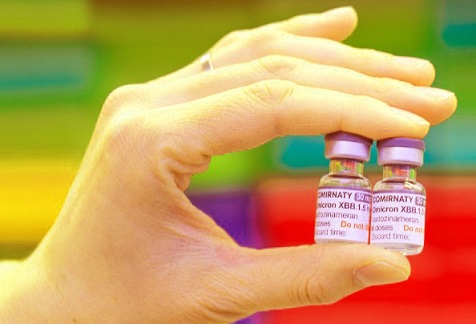COVID-19 Boosters Containing XBB.1.5 Induced Lower CD4+ T Cell Responses in the Elderly Against BA.2.86 and JN.1 Lineages!
Nikhil Prasad Fact checked by:Thailand Medical News Team Dec 24, 2024 1 year, 1 week, 6 hours, 37 minutes ago
Medical News: The continuous emergence of SARS-CoV-2 variants poses a persistent challenge to vaccine efficacy. The latest study by a group of Italian researchers sheds light on the immune responses induced by the XBB.1.5-containing COVID-19 booster in elderly individuals. Conducted by experts from the University of Pavia, the University of Insubria, and Fondazione IRCCS Policlinico San Matteo, this research focuses on the CD4+ T cell responses against the BA.2.86 and JN.1 variants in vaccinated elderly subjects.
 COVID-19 Boosters Containing XBB.1.5 Induced Lower CD4+ T Cell Responses in the
COVID-19 Boosters Containing XBB.1.5 Induced Lower CD4+ T Cell Responses in the
Elderly Against BA.2.86 and JN.1 Lineages!
The study evaluated immune responses in two groups: elderly individuals who had received the updated XBB.1.5 booster and COVID-19-naïve healthcare workers vaccinated with the first-generation Pfizer-BioNTech mRNA vaccine. This
Medical News report explores the findings and their implications for future vaccine strategies, especially for vulnerable populations.
Study Overview: Participants and Methodology
The research involved 18 elderly individuals (mean age 81.5 years) who had received at least three doses of the COVID-19 mRNA vaccine and an additional XBB.1.5 booster dose. These participants were compared to 15 healthcare workers who had not been exposed to SARS-CoV-2 and were vaccinated during the initial rollout of the Pfizer-BioNTech vaccine in 2021.
Blood samples from both groups were analyzed to measure T cell activation and antibody responses. Researchers assessed the immune response to the ancestral SARS-CoV-2 strain and the BA.2.86 and JN.1 Omicron subvariants through flow cytometry, ELISpot assays, and antibody tests.
Key Findings: Lower T Cell Responses in the Elderly
The study found that elderly individuals exhibited significantly reduced CD4+ T cell responses to the BA.2.86 and JN.1 variants, even after receiving the updated XBB.1.5 booster. In contrast, COVID-19-naïve healthcare workers demonstrated robust T cell responses to the ancestral strain and the BA.2.86 variant.
Interestingly, their responses to the JN.1 subvariant were markedly lower compared to the ancestral strain.
Despite vaccination, the elderly group showed diminished interferon-gamma (IFN-γ) secretion - a key marker of T cell activation - following stimulation with BA.2.86 and JN.1 RBD proteins. CD4+ T cells, the most responsive subset in the T cell population, displayed reduced activation in response to these subvariants. This aligns with the broader challenges of immune senescence in aging populations.
Antibody Responses: Mixed Results
The researchers also measured antibody levels against the RBDs of the ancestral strain, BA.2.86, and JN.1 variants. In the elderly group, antibody levels were comparable for the ancestral strain and BA.2.86 but significantly lower for JN.1. Conversely, health
care workers showed reduced antibody recognition of BA.2.86 but similar responses to the ancestral and JN.1 strains.
These findings suggest that while the XBB.1.5 booster elicits some level of antibody response, it may not provide robust protection against newer variants like JN.1, particularly in older adults.
Implications for Vaccine Strategies
The results highlight the limitations of current mRNA vaccines in generating robust T cell responses in elderly individuals. Given that T cells play a crucial role in controlling infections and supporting long-term immunity, the observed decline in CD4+ T cell reactivity is concerning.
The study’s authors emphasize the need for tailored vaccine strategies to address the vulnerabilities of aging immune systems. Potential approaches include developing vaccines that target multiple antigens or using adjuvants to enhance T cell responses. Additionally, combining mRNA technology with other platforms, such as protein subunit or viral vector vaccines, may offer broader and more durable immunity.
Understanding the Role of Immune Senescence
Aging is associated with a decline in immune function, known as immune senescence, which affects both innate and adaptive immunity. This phenomenon contributes to the reduced efficacy of vaccines in older populations. The study’s findings underscore the importance of considering age-related immune changes when designing vaccination strategies.
Moreover, the researchers noted that repeated mRNA vaccination might shift the immune response toward producing IgG4 antibodies. While these antibodies are less inflammatory, they may also reduce the effectiveness of antibody-mediated immunity. This could partially explain the suboptimal immune responses observed in elderly vaccine recipients.
Study Limitations and Future Directions
The study acknowledges several limitations. The sample size was small, and the lack of a younger control group vaccinated with the XBB.1.5 booster limits direct comparisons. Additionally, the study did not include overlapping peptide pools for the JN.1 variant due to their unavailability at the time.
Future research should focus on larger, more diverse populations and explore the effects of combining different vaccine platforms. Longitudinal studies are also needed to assess the durability of immune responses and their correlation with clinical outcomes, such as protection against severe disease and hospitalization.
Conclusion: A Call for Innovation
The findings of this study underscore the challenges of protecting elderly populations against emerging SARS-CoV-2 variants. While mRNA vaccines have been a groundbreaking tool in combating the pandemic, their limitations in older adults necessitate innovative approaches.
New vaccine strategies should prioritize enhancing T cell responses and addressing immune senescence. Tailored interventions, including combination vaccines and alternative delivery platforms, may hold the key to providing robust and long-lasting protection for the most vulnerable populations.
The study findings were published in the peer-reviewed journal: Vaccines.
https://www.mdpi.com/2076-393X/12/12/1451
For the latest COVID-19 Vaccine News, keep on logging to Thailand
Medical News.
Read Also:
https://www.thailandmedical.news/news/swedish-case-of-ephemeral-diabetes-after-covid-19-vaccination-case-sparks-interest
https://www.thailandmedical.news/news/high-prevalence-of-autoimmune-issues-found-in-those-with-post-acute-covid-vaccination-syndrome
https://www.thailandmedical.news/articles/vaccine-news
